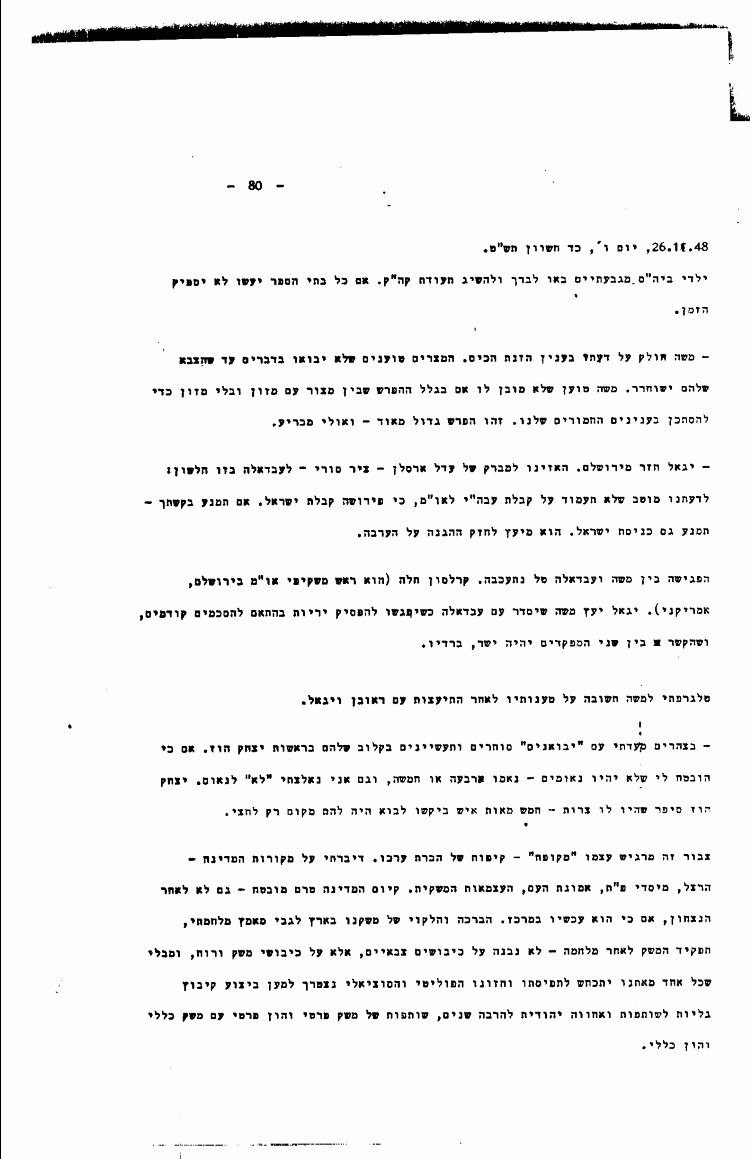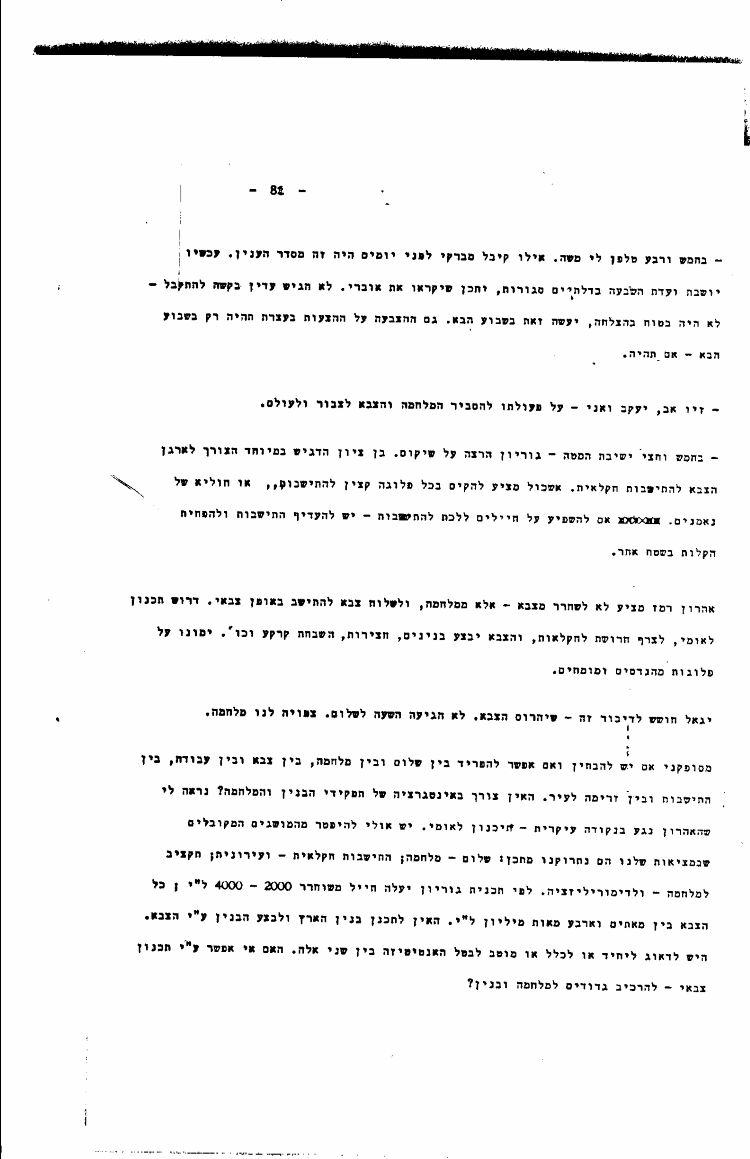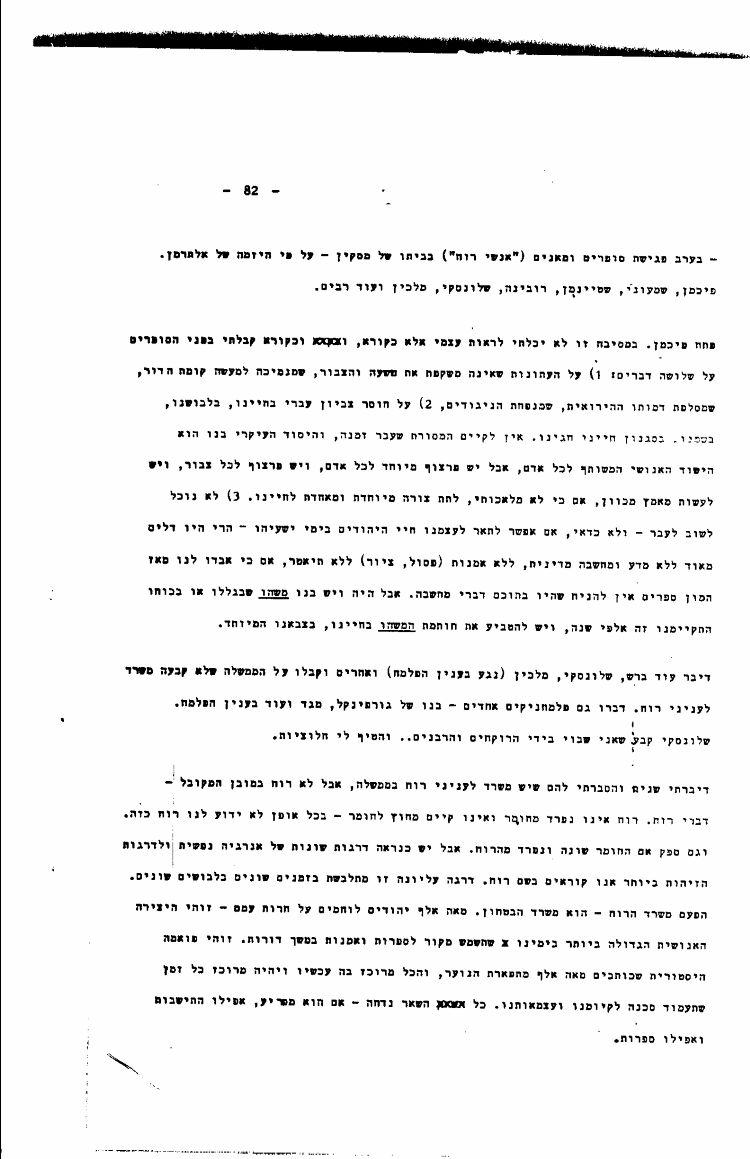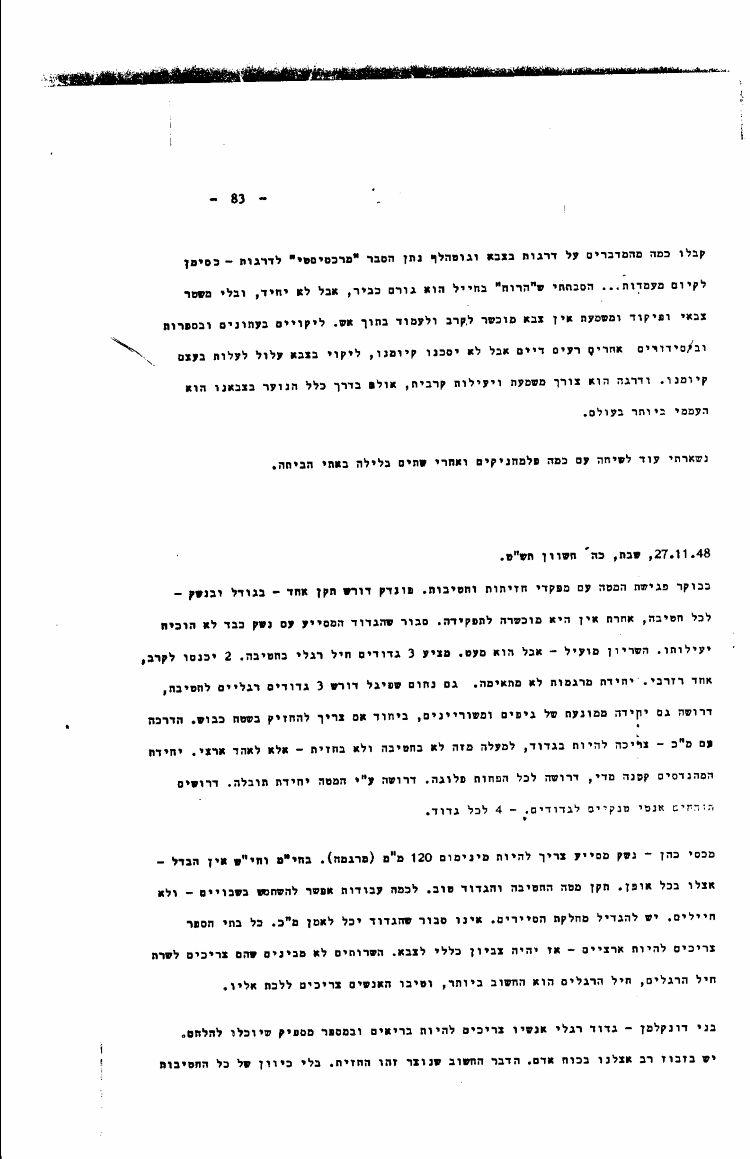1
of
Places:
Giv'atayim
Yakum
Dorot
Nayn
Re'im
Jerusalem
al-Tall
People:
The use of the photograph is subject to the Copyright Law, 2007
26.11.1948
225143
Friday, November 26, 1948 Schoolchildren from Givatayim came to deliver readings and present a KKL [Keren Kayement LeIsrael – Jewish National Fund] certificate. If all the schools do this – there won’t be enough time. – Moshe [Sharett] disputes my opinion regarding the provision of food to the “pocket.” The Egyptians asserted they won’t enter into talks until their soldiers are released. Moshe argues that it’s not clear to him whether the difference between a siege with food and [one] without food is worth the severe risks to us. [However,] this difference is great – maybe decisive. – Yigael [Yadin] returned from Jerusalem. Reportedly Adil Arslan – Syrian envoy – told [King] Abdallah that: in their view it’s better not to insist on Transjordan’s admission to the UN, because that means admitting Israel. If his request doesn’t take place – Israel’s admission also won’t take place. He advises reinforcing the defense of the ‘Arava. The meeting between Moshe [Dayan] and Abdallah [al-]Tall was postponed. [Colonel] Carlson was sick (he’s head of the UN observers in Jerusalem, American). Yigael [Yadin] advised Moshe [Dayan] to arrange with Abdallah [al-Tall], when they meet, that they stop shooting, per previous agreements, and that communication between the two commanders be direct, by radio. I telegraphed Moshe [Sharett] an answer to his assertions – after consulting with Reuven [Shiloah] and Yigael [Yadin]. – I lunched with “importers,” traders, and industrialists at their club headed by Yitzhak Hoz. Although I was promised that there wouldn’t be any speeches – there were four or five speakers, and I was also compelled “not” to give a speech. Yitzhak Hoz told me that he had problems – 500 people had asked to participate and they only had space for half. This community feels that it’s “discriminated against” – undervalued. I spoke about the origins of the state – Herzl, the founders of Petah Tikva, the people’s faith, economic independence. The state’s existence is not guaranteed yet – not even after victory, although it’s at the center now. The blessing and shortcoming of our country’s economy with regard to the war effort, the role of the economy after the war – isn’t built on military conquests, but on economic and spiritual conquests, and, while not denying each of our political and socialist outlooks and missions, we will need, for the sake of the ingathering of exiles, for the sake of Jewish partnership and fraternity for many years, a partnership of the private sector and private capital with the general economy and general capital. – At 5:15 Moshe [Sharett] telephoned me. If he had received my cable two days ago, it would have settled the matter. Now the Committee of Seven [Security Council committee on the Negev] is meeting, behind closed doors. They might call upon Aubrey [Abba Eban]. [He] hasn’t yet submitted a request for admission [to the UN] – wasn’t sure of its success. He’ll do that next week. The vote on proposals in the [General] Assembly also won’t be until next week – if it takes place. – [Yitzhak] Ziv-Av, Ya’akov [Dori], and I – on his effort to explain the war and the army to the public and the world. – At 5:30 [General] Staff meeting – [Yosef] Gurion spoke on rehabilitation. Ben-Zion [Israeli] put special emphasis on the need to organize the army for agricultural settlement. [Levi] Eshkol proposes appointing a settlement officer in each [military] company, or a unit of loyalists. If [we want] to convince soldiers to participate in the settlement enterprise – then settlement should be prioritized [in granting benefits to discharged soldiers] and benefits in other areas should be reduced. Aharon Remez proposes not discharging [soldiers] from the army – but from the war, and sending soldiers to settle in a military sense. [We] need national planning, combining industry with agriculture, and the army will work on construction projects, quarries, land reclamation, etc. Engineers and experts will be placed in charge of [military] companies. Yigael [Yadin] is concerned about this kind of talk – that it will destroy the army. The moment of peace hasn’t arrived yet. War is [still] ahead of us. I doubt whether it’s necessary or possible to distinguish between peace and war, between army and work, between the settlement enterprise and migration to the city. Isn’t it necessary to integrate the tasks of construction and warfighting? It seems to me that Aharon touched on the key points – national planning. It may be necessary to discard the customary concepts of our reality. They’ve been depleted of meaning: peace – war; agricultural settlement – and urban [settlement], funding for war – and for demobilization. Under Gurion’s plan a discharged soldier would cost P£ 2,000-4,000, the entire army – between P£ 200 and 400 million. Shouldn’t the building of the country be planned and carried out by the army, is it necessary to focus on the individual versus the collective, or is it better to discard the antithesis between these two [?]. Is it not possible through military planning – to compose battalions for war and construction? – In the evening a meeting of writers and artists (“intellectuals”) at [Aharon] Meskin’s home – initated by [Natan] Alterman. [Ya’akov] Fichman, [David] Shimoni, [Eliezer] Steinman, Hannah [Rovina], [Avraham] Shlonsky, [Dov Ber] Malkin, and many others. Fichman opened [the meeting]. At this gathering I could not see myself as anything but a reader, and as a reader I complained to the writers about three things: 1) about the press not reflecting the moment and the public, in fact downplaying the stature of the generation, distorting its heroic image, exaggerating differences; 2) about the lack of a Hebrew character in our lives, in our clothing, in our names, in our lifestyle, in our holidays. [We] shouldn’t uphold a tradition whose time has passed, and our fundamental essence is the human essence common to every man, but each man has a unique face, and each community has a face, and a concerted, though not artificial, effort should be made to grant a special and uniting form to our lives; 3) we cannot return to the past – and shouldn’t. If we could envision the lives of Jews in the days of Isaiah – it would be apparent that they were very paltry, without science or scientific thought, without art (sculpting, painting), without theater; although many books have been lost since then, we can’t presume that they contained works of artistry. But there was and is something in us because of which or through the power of which we have existed for thousands of years, and the seal of this something should be imprinted in our lives, in our unique character. [Asher] Barash, Shlonsky, Malkin (touched on the Palmach issue), and others also spoke, and complained about the government not establishing a ministry for matters of spirit [humanities, arts]. A few Palmachniks [Palmach members] also spoke – the son of Yisrael Gurfinkel[Haim Gouri], [Matti] Meged, and others regarding the Palmach. Shlonsky asserted that I’m in the pocket of the Rokachs [Israel Rokach, one of the leaders of the right] and the rabbis, and preached at me regarding halutziyut [the Zionist pioneering spirit]. I spoke again and explained that there is a ministry for matters of spirit, though not spirit in the customary sense – but rather, matters of spirit. Spirit is not separate from matter and does not exist outside of matter – at least we know of no such spirit. And it is also doubtful whether matter differs from and is separate from spirit. But apparently there are different degrees of spiritual energy, and we refer to the highest degrees as spirit. This highest degree takes different forms at different times. This time the ministry of spirit is the Ministry of Defense. 100,000 Jews are fighting for the freedom of their people – this is the greatest human creation of our time, which will serve as a source for literature and art for generations. It is a historic poem being written by 100,000 of the very best of our youth, and everything is embodied within it and will be embodied as long as there is a threat to our existence and our independence. Everything else is pushed aside – if it is disruptive – even the settlement enterprise and even literature. A few of the speakers complained about ranks in the army, and [Yehuda] Gothelf gave a “Marxist” explanation of ranks – as a symbol of the class system… I explained that the “spirit” of the soldier is a fine quality, but not the only one, and without a military system and command and discipline an army is not fit for battle – fit to face fire. Flaws in newspapers and in literature and in other systems are bad enough, but won’t threaten our existence. A flaw in the army could cost us our very existence. And rank is necessary for discipline and combat effectiveness, although generally the youth of our army are the most popular [in the Marxist sense: of the people] in the world. I stayed for further conversation with a few Palmachniks and got home after 2 a.m.












